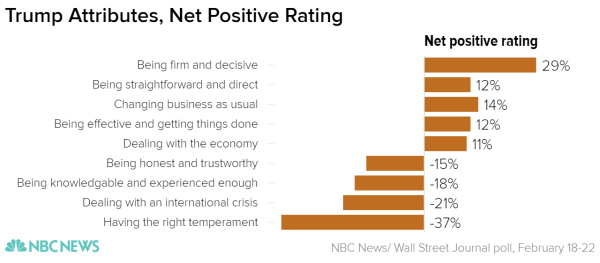Just to be completely clear, I've been writing posts like this and this not in order to convey rubber-stamp approval of everything President Trump is doing. My analysis, as usual, is rooted in a case-by-case, "call 'em as I see 'em" philosophy -- which has produced decidedly positive and negative appraisals. No, more than anything else, these polling posts are shots across the media's bow. The press is by and large adamantly opposed to Donald Trump's presidency and agenda. Much of their related coverage has fallen somewhere on the spectrum of hostile to apocalyptic, and has at times been overblown or inaccurate, to boot. The latest NBC/WSJ national survey should give The Resistance and their elite media cheerleaders some pause as they evaluate their collective posture toward the new administration. It probably won't, but it should. In the poll, a majority (51 percent) says that since the election, the media has been too critical of Trump, with just six percent demanding tougher coverage of him. Only four-in-ten Americans believe the media has treated him in a fair and objective manner overall. Further, 53 percent agree with the following statement: "The news media and other elites are exaggerating the problems with the Trump administration because they are uncomfortable and threatened with the kind of change that Trump represents." Forty-five percent disagree. This is evidence of a gaping disconnect.
The president's approval rating is slightly underwater (44/48), a figure that is leavened by fairly widespread optimism about the future of the country and US economy. Sixty percent say they're "hopeful and optimistic" about America, with 40 percent calling themselves "worried and pessimistic." By a similar 20-point margin, more Americans say they expect the economy to improve over the next year, with only one-in-five expecting it to worsen. In certain circles, it's taken for granted that the sky is falling, but that sentiment simply hasn't taken root among most Americans. Liberal Bubble-dwellers believe the nation has galvanized against Trump, with pervasive buyers' remorse setting in; this data punctures that illusion. As for favorability, despite all the news coverage painting Trump as a train wreck, Republicans as craven enablers, and Democrats as righteous opponents, Trump and his allies are in much better shape than the Democratic Party:
NBC/WSJ poll (D+5 sample): GOP viewed significantly more favorably than Dems. Pelosi = least liked politician in USA (-25) vs Trump (-4): pic.twitter.com/gJMhsp0xvW
— Guy Benson (@guypbenson) February 27, 2017
Good move re-electing her, House Democrats. Those favorability outcomes translate into policy preferences, too:
NBC/WSJ poll: Who should take the lead in setting policy for the US?
— Guy Benson (@guypbenson) February 27, 2017
Trump + Hill GOP: 52%
Hill Democrats: 37%
Meanwhile, as liberals high-five each other over Obamacare's improved (but still weak) standing in public opinion polls, this survey shows that Americans are almost exactly split on whether the law was generally a good idea. But the numbers get worse for Democrats from there. Just four percent (!) say Obamacare is "working well the way it is" (that number is dreadfully low for good reason), whereas a 52-percent majority believes it requires a "major overhaul" or should be "totally eliminated." Approximately one-third of voters say they have confidence in the GOP's ability to replace the law with something better, with a similar number expressing little or no confidence. Twenty-two percent give "mixed opinions." These are the so-called 'persuadables' whom Republicans must seek to convince with strong, unified messaging. Gulp. Relatedly, this trend -- which we've been tracking and writing about for years -- remains intact:
NBC/WSJ is the latest poll to confirm that significantly more Americans have been harmed by #Obamacare (30%) than helped (24%).
— Guy Benson (@guypbenson) February 27, 2017
That ought to be a major talking point for the GOP as this legislative battle plays out. In other odds and ends, voters are closely divided (44/45) on Trump's 'travel ban' executive order, a revamped version of which is expected this week. A majority of voters agrees that Russia meddled in the 2016 election, with a similar number backing the Congressional investigation into the matter. A plurality of voters say that free trade has helped the US in general, but a majority believes free trade agreements have been detrimental. I'll leave you with NBC's infographic illustrating the president's personality strengths and weaknesses:

